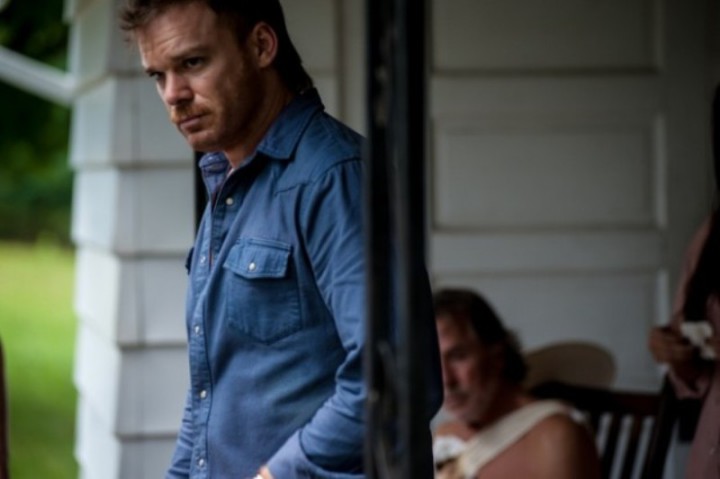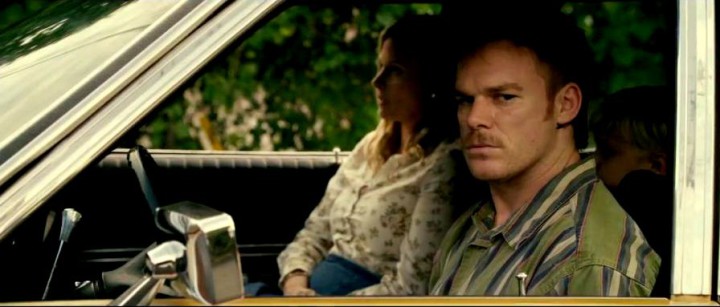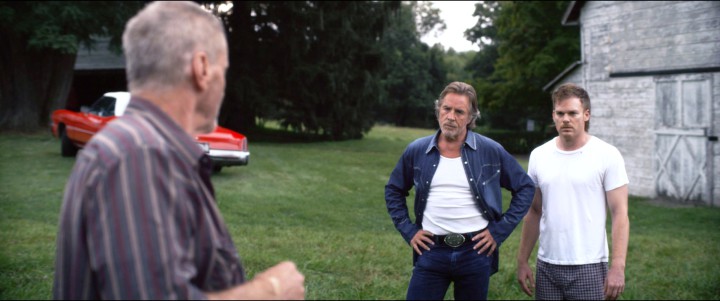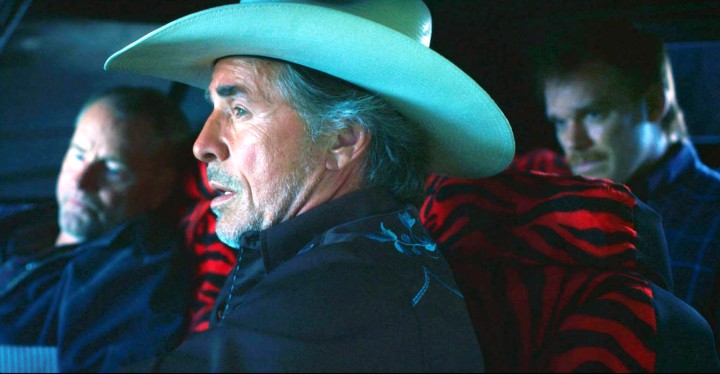The neo-noir thriller Cold in July is the sort of movie that might make a director’s career. In the case of Jim Mickle, it’s the kind of movie that could launch him into the mainstream and out of the horror genre niche he’s already carved. Yes, it really is that good. It has a lot of the same feeling and freshness that the Coens exhibited with Blood Simple in 1984. It’s not as stylish as that minor classic, but it has a good deal of the same quirky humor and penchant for ever-darker twists and turns. Also, like Blood Simple, it’s not a particularly deep film, but it’s one that takes the viewer through a labyrinthian chain of events that provides a wild ride that won’t soon be forgotten. It has no loftier goal — apart from announcing the presence of Mickle and his writing partner Nick Damici to a wider moviegoing public as forcefully and unpredictably as possible.
Michael C. Hall plays Richard Dane, a not particularly notable or quick-witted picture framer with a business in a small Texas town, circa 1989. (The date helps explain the film’s echt-1980s electronic soundtrack, although it also turns out the soundtrack is an homage to John Carpenter’s 80s films.) The movie starts with Dane nervously shooting and killing an intruder in his house. This event makes him an accidental hero to a lot of the town. He takes no pride in this, especially since it turned out the intruder was unarmed, but he also gets more than he bargained for when Russel (Sam Shepard), the father of the man he killed, engages him in a cat-and-mouse game of revenge. Right about this point, the viewer is thinking that this is pretty thin stuff for a feature. This, I suspect, is a deliberate ploy by Mickle, who constantly leads us to believe we’re watching one kind of story, only to have it turn out to be something very different. That’s certainly the case here when Dane learns he shot someone other than Russel’s son, a fact the cops dismiss, but then the cops also try to engineer the accidental death of Russel — who is rescued by Dane.
What follows — after digging up the dead man and proving to Russel that it isn’t his son — is the strange teaming of Dane and Russel to get at the truth and find the supposedly dead son. Why Dane gets involved has more to do with his own curiosity than anything. Telling his wife (Vinessa Shaw) a bizarre fabrication about a business trip, Dane sets out with Russel to find the old man’s detective buddy Jim Bob (Don Johnson). Jim Bob — and his bright red Cadillac festooned with steer horns — is not only the man they need, he’s the outrageous seasoning the movie needs to take us on the increasingly intense, grisly trip that leads to what can best be described as carnage on a grand opera scale. It pulls no punches, yet it’s more exciting and strangely satisfying than outright gruesome.
Mickle deftly creates the atmosphere of a nightmarish criminal underworld, often disguised as the blandly normal. (Yes, there’s an element of David Lynch here.) He also creates the sense of oppressive Texas heat — and it really is a creation since the film was mostly shot in rural central New York, but you’d never guess it. In a sense, the movie is a dryly humorous odd-buddy road trip to hell. But it’s more than that, because there are serious undercurrents to it all, and the stakes are very real. Like the twisty narrative, what starts out as one thing keeps making unexpected and sometimes unsettling turns that make Cold in July fascinating, compelling and, yes, essential viewing. Not Rated, but it’s definitely not for children.
Playing at Carolina Cinemas.








It’s the real deal. The screener sits on my desk and instead of watching it at home I’m seriously considering seeing it on the big screen for the prospect of an even better experience.
Valid points all around.
How violent is this? Debating on going with a friend, but he’s queasy when it comes to extreme violence.
I am the wrong person to ask, because violence in movies so rarely bothers me. It’s pretty violent, but it didn’t strike me especially gory or sadistic. But that’s me.
I’d agree with Ken’s assessment: no spouting blood or much carnage.
And there you have it.
Did remarkably well opening weekend. Still with us.